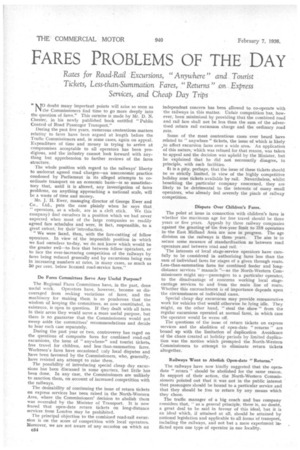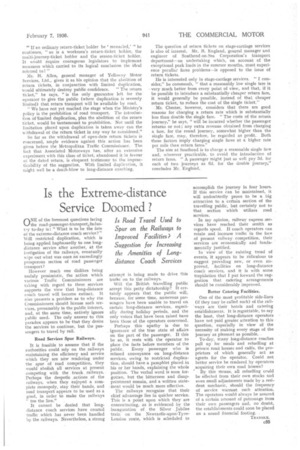FARES PROBLEMS OF THE DAY
Page 108

Page 109

If you've noticed an error in this article please click here to report it so we can fix it.
Rates for Road-Rail Excursions, " Anywhere " and Tourist Tickets, Less-than-Summation Fares, "Returns on Express Services, and Cheap Day Trips
" MO doubt many important points will arise so soon as 11 the Commissioners find time to go more deeply into the question of fares." This surmise is made by Mr. D. N. Chester, in his newly published book entitled "Public Control of Road Passenger Transport."
During the past five years, numerous contentious matters relating to fares have been argued at length before the Traffic Commissioners and, in some cases, again on appeal. Expenditure of time and money in trying to arrive at compromises acceptable to all operators has been prodigious, and the industry cannot look forward with anything but apprehension to further reviews of the fares structure.
The whole position with regard to the railways' liberty to undercut agreed road charges—an uneconomic practice condoned by Parliament in its alleged attempts to coordinate transport on an economic basis—is so unsatisfactory that, until it is altered, any investigation of fares problems, on anything approaching a national scale, will be a waste of time and money.
Mr. J. H. Ewer, managing director of George Ewer and Co., Ltd.. puts the case plainly when he says that
" operators, as a whole, are in a cleft stick. We (his company) find ourselves in a position which we had never expected when most of the large companies so readily agreed fare schedules and were; in fact, responsible, to a great extent, for their 'introduction.
"We were faced, then, with the fare-cutting of fellow operators. In view of the impossible position in which we find ourselves to-day, we do not know which would be the greater evil—to face that between fellow operators, or to face the ever-increasing competition of the railways by fares being reduced generally and by excursions being run in increasing numbers at rates, in many cases, as much as 50 per cent, below licensed road-service fares."
Do Fares Committees Serve Any Useful Purpose?
The Regional Fares Committees have, in the past, done useful work. Operators have, however, become so discouraged from seeking variations of fares, and the machinery for making them is so ponderous that the wisdom of keeping the committees, as now constituted, in exister.ce, is open to question. If they dealt with all fares in their areas they would serve a more useful purpose, but there is no guarantee that the Commissioners would not sweep aside the committees' recommendations and decide to hear each case separately.
During the past year or two, controversy has raged on the questions of composite fares for combined road-rail excursions, the issue of "anywhere." and tourist tickets, free travel for children, and less than-summation fares. Workmen's fares have occasioned enly local disputes and have been favoured by the Commissioners, who, generally, have resisted any attempt to raise them.
The possibility of introducing special cheap day excursions has been discussed in some quarters, but little has been clone. In any case, the Commissioners are unlikely to sanction them, on account of increased competition with the railways.
The desirability of continuing the issue of return tickets on express services has been raised in the North-Western Area, where the Commissioners' decision to abolish them was overruled by the Minister of Transport. It is now feared that open-date return tickets on long-distance services from London may he prohibited.
The principal objection to the combined road-rail excursion is on the score of competition with local operators. Moreover, we are not aware of any occasion on which an
c..54 independent concern has been allowed to co-operate with the railways in this matter. Unfair competition has, however, been minimized by providing that the combined road and rail fare shall not be less than the sum of the advertised return rail excursion charge and the ordinary road rate.
Some of the most contentious cases ever heard have related to " anywhere" tickets, the issue of which is likely • to affect excursion fares over a wide area. An application of this nature, which was refused for that reason, was taken to appeal and the decision was upheld by the Minister, but he explained that he did not necessarily disagree, in principle, with such facilities.
It is a pity, perhaps, that the issue of these tickets should be so strictly limited, in view of the highly competitive holiday zone tickets available by rail. Nevertheless, whilst benefiting the particular company concerned, they are likely to be detrimental to the interests of many small operators, who already feel severely the pinch of railway competition.
Dispute Over Children's Fares.
The point at issue in connection with children's fares is whether the maximum age for free travel should be three years or five years. Appeals by three railway companies against the grantingof the five-year limit to 3/8 operators in-the East Midland Area are now in progress. The age division on the railways is three years. The aim is to secure some measure of standardization as between road operators and between road and. rail.
The interests of local stage-service operators have carefully to be considered in authorizing fares less than the sum of individual fares for stages of a given through route. Less-than-summation fares for combined feeder and longdistance services " manacle "—as the North-Western Commissioners might say—passengers to a particular operator, to the disadvantage of concerns working local stagecarriage services to and from the main line of route. Whether this encroachment is of importance depends upon the circumstances of individual cases.
Special cheap day excursions may provide remunerative• work for vehicles that would otherwise be lying idle. They might, on the other hand, "steal the show" from the regular excursions operated at normal fares, in which case the operator would be worse off.
The questions of the issue of return tickets on express services and the abolition of open-date " returns " are bound up with the limitation of duplication Avoidance of the chaos created at holiday periods by limited duplication was the motive which prompted the North-Western Commissioners to attempt to eliminate return tickets altogether.
Railways Want to Abolish Open-date "Returns."
The railways have now kindly suggested that the opendate return" should he abolished for the same reason. In support of their action, the North-Western Commissioners pointed out that it was not in the public interest that passengers should be bound to a particular service and that they should be free to return by any means which they chose.
The traffic manager of a big coach and bus company considers that, " as a general principle, there is, no doubt, a great deal to be said in favour of this ideal, but it is an ideal which, if attained at all, should be attained by national legislation and applicable to all forms of transport, including the railways, and not but a mere experiment inflicted upon one type of operator in one locality.
" If an ordinary return-ticket holder be manacled,' " he continues, " so is a workmen's return-ticket holder, the multi-journey-ticket holder and the season-ticket holder. It would require courageous legislators to implement measures which carried to its logical conclusion the ideal referred to! "
Mr. H. Allen, general manager of Yelloway Motor Services, Ltd., gives it as his opinion that the abolition of return tickets, in conjunction with limited duplication, would ultimately destroy public confidence. "The return ticket," he says, " is the only guarantee left for the operator to give the public (where duplication is severely limited) that return transport will be available by road.
" We have not yet reached the stage when the Ministry's policy is the prohibition of road transport. The introduction of limited duplication, plus the abolition of the return ticket, would be tantamount to prohibition. Not until the limitation placed upon duplication is taken away can the withdrawal rat the return ticket in any way be considered."
So far as the withdrawal of open-date return tickets is concerned, ample evidence against this action has been given before the Metropolitan Traffic Commissioner. The tact that Associated Motorways has, after an extensive experiment with this class of ticket, abandoned it in favour of the dated return, is eloquent testimony to the impracticability of the suggestion. With limited duplication, it might well be a death-blow to long-distance coaching. The question of return tickets on stage-carriage services is also of interest. Mr. B. England, general manager and engineer of Southend-on-Sea Corporation's transport department--an undertaking which, on account of the exceptional peak loads in the summer months, must experience peculiar fares problems—is opposed to the issue of return tickets.
He is interested only in stage-carriage services. " I consider," he comments, " that a reasonably low single fare is • very much better from every point of view, and that, if it be possible to introduce a substantially cheaper return fare, it would generally be possible, instead of that cheaper return ticket, to reduce the cost of the single ticket."
Mr. Chester, however, considers that there are good reasons for charging a return rate which is substantially less than double the single fare. " The costs of the return journey," he says, " will be incurred whether the passenger returns or not ; any extra revenue obtained from charging a fare, for the round journey, somewhat higher than the single fare, may, therefore, be regarded as profit. Both these factors imply charging single fares at a higher rate per mile than return fares."
The aim at Southend is to charge a reasonable single fare and, wherever practicable, to avoid the introduction of return fares. " A passenger might just as well pay 3d. for each of two journeys as Od. for the double journey," concludes Mr. England.




































































































































































